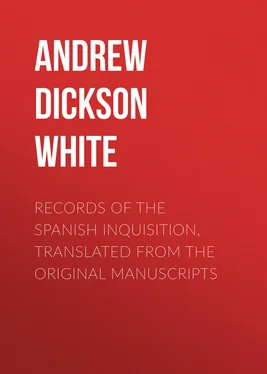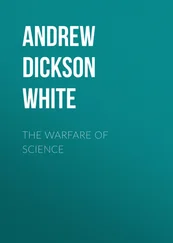Andrew Dickson White - Records of the Spanish Inquisition, Translated from the Original Manuscripts
Здесь есть возможность читать онлайн «Andrew Dickson White - Records of the Spanish Inquisition, Translated from the Original Manuscripts» — ознакомительный отрывок электронной книги совершенно бесплатно, а после прочтения отрывка купить полную версию. В некоторых случаях можно слушать аудио, скачать через торрент в формате fb2 и присутствует краткое содержание. Жанр: foreign_prose, foreign_religion, Философия, foreign_psychology, foreign_antique, на английском языке. Описание произведения, (предисловие) а так же отзывы посетителей доступны на портале библиотеки ЛибКат.
- Название:Records of the Spanish Inquisition, Translated from the Original Manuscripts
- Автор:
- Жанр:
- Год:неизвестен
- ISBN:нет данных
- Рейтинг книги:3 / 5. Голосов: 1
-
Избранное:Добавить в избранное
- Отзывы:
-
Ваша оценка:
- 60
- 1
- 2
- 3
- 4
- 5
Records of the Spanish Inquisition, Translated from the Original Manuscripts: краткое содержание, описание и аннотация
Предлагаем к чтению аннотацию, описание, краткое содержание или предисловие (зависит от того, что написал сам автор книги «Records of the Spanish Inquisition, Translated from the Original Manuscripts»). Если вы не нашли необходимую информацию о книге — напишите в комментариях, мы постараемся отыскать её.
Records of the Spanish Inquisition, Translated from the Original Manuscripts — читать онлайн ознакомительный отрывок
Ниже представлен текст книги, разбитый по страницам. Система сохранения места последней прочитанной страницы, позволяет с удобством читать онлайн бесплатно книгу «Records of the Spanish Inquisition, Translated from the Original Manuscripts», без необходимости каждый раз заново искать на чём Вы остановились. Поставьте закладку, и сможете в любой момент перейти на страницу, на которой закончили чтение.
Интервал:
Закладка:
Questioned, if he remembered having gone before any justice, and given his deposition against any person concerning religious matters.
Answered, that he remembered having deposed before the said Dr Pablo Pasqual Marquez, Commissary of the Holy Office, against a certain stranger, accompanied by a French doctor who had been imprisoned by the Holy Office. The substance of this deposition he repeated, and requested it to be read.
He was then informed that the Promotor Fiscal of the Holy Office presented him as a witness in an action which he had commenced against the above person, whose name it was ascertained was Juan Duran. He was ordered to give attention while his deposition was read, and if he found anything to alter or add, to do it in such a manner as to declare the whole truth, for his present declaration might be of service to the said Juan Duran. The deposition was then read de verbo ad verbum , which the said Pedro Oriola having heard and understood, he declared it to be his testimony, and that it was correctly recorded; that he had nothing to add or amend, but was willing to repeat the whole anew. He was again, under oath, enjoined secrecy, which he promised. The whole I sign for him.
Pedro Oriola, Apothecary .Before me—
Geronymo Juan Rossellon, Presbyter Notary of the Holy Office.[ Here follows, in the original, the ratification in the same manner of all the other testimony. ]
In the town of Valles, on the day, month, and year above specified, before the said Commissary, appeared, according to summons, and swore formally to declare the truth, a person calling himself Juan Llaurador, blacksmith, an inhabitant of the said town, of age, as he stated, twentyone years, or thereabout.
Questioned, if he knew or conjectured the cause of his being summoned to appear.
Answered, that he neither knew nor conjectured.
Questioned, if he knew or had heard that any person had said aught which was, or appeared to be contrary to our holy Catholic Faith, and Evangelical Doctrine professed and taught by the holy Mother Roman Catholic Church, or against the proper and free jurisdiction of the Holy Office.
Answered, that on a certain day, shortly before the feast of All Saints, Pablo Vicens came to his house, where his father, Pablo Llaurador, himself, and an apprentice were at work, with another person, whose name deponent did not know, but noticed that he spoke hardly a word. These persons being together, the said Pablo Vicens observed that he was astonished and grieved that there existed a man who could say he had a book, which, being thrown into a fire with an image of Christ, the book would be saved, and the Christ burnt. Upon which he was answered by the person abovementioned, who called himself Juan Duran, and was a native of the city of Manresa, that he was the man whom he meant, but that his assertion was only that the Christ would be consumed before the prayer contained in the book, if the Christ were not consecrated. At this they all reprimanded him, and declared that a simple representation of Christ crucified was more powerful than his book or prayer. The said Juan Duran, being thus contradicted and reproved by every one, was silent, and left the place. The deponent also heard the said Juan Duran say, in conversation, that he knew more than the doctors; that the Virgin, Our Lady del Rosario had appeared to him and given him her benediction, and that by her assistance he could cure better than the doctors, and do anything better than other persons. The deponent also heard Jayme Carbonell say, that Juan Duran had declared, in his presence, that he was next to God. He has also heard Juan Duran read or recite out of a little book, as large as the hand, at which all the family laughed. The said book the deponent has seen.
The above is the truth, according to the oath of the deponent, and being read in his presence, is declared by him to be faithfully recorded. He further states that he does not make this declaration out of malice, and promises secrecy. Being unable to write, I, the said Commissary, sign in his name.
Dr Pablo Pasqual Marquez, Commissary .Before me—
Geronymo Juan Rossellon, Presbyter Not’y of the Holy Office.15 15 Calificacion or qualification , a judgment pronounced upon the character and tendency of any actions or speeches denounced before the Inquisition. This was done by officers holding a special commission for that purpose called Calificadores .
A certain person, native of this principality, has stated, in conversation, two or three times, that he possessed a book containing a prayer of such efficacy, that if the book were thrown into a fire along with a crucifix, this last would be consumed before the book; which assertion being repeated by him with great earnestness, he was reproved for it, and told among other things, that if the Inquisition knew it, he would be punished, which silenced him after some time. The abovementioned book he exhibited several times.
2d. The same person declared on another occasion, that he was very skilful in curing disorders; that the Holy Virgin del Rosario had appeared to him and empowered him to heal diseases, and given him her benediction.
3d. The same person on another occasion declared that he had a book which he would not sell for fifty ducats, as by merely looking at it he could cure any disease, and even restore a dead person to life; that if people knew his great powers, he should grow very rich; and that he was circumcised with wounds and blood like Jesus Christ.
In the Royal Palace of the Inquisition of Barcelona, on the tenth day of December, one thousand six hundred and thirtytwo, being present at the afternoon audience, the Inquisitors, Dr Bernardo Luis Cotoner, Dr Domingo Abbad y Huerta, Father Vincente Navarro, Father Martin Perez and Geronymo Vidal, Jesuits and Calificadores of this Holy Office,—and having examined the above propositions, declared, unanimously, that the
1st, is a superstitious compact with the devil, and the comparison of the book to the figure of Christ a blasphemy; the
2d, vain and superstitious; and the
3d, is a superstitious imposture; and the assertion of being circumcised, one which creates suspicions of enmity to our Holy Faith.
Vicente Navarro, Jesuit . Martin Perez, Jesuit and Lecturer in Theology. Geronymo Vidal, Jesuit .Before me—
Miguel Rodriguez.In the Royal Palace of the Inquisition of Barcelona, on the tenth day of January, one thousand six hundred and thirtythree, the Inquisitor, Dr Bernardo Luis Cotoner, being at his morning audience, ordered to be brought from the secret prison, a certain person, who, on his appearance, was formally sworn to declare the truth in this audience and all others, till the conclusion of his trial, and to keep secret whatever he might see or hear, and everything which should befall him, concerning his trial.
Questioned, what was his name, birthplace, age, occupation, and the date of his imprisonment.
Answered, that his name was Juan Duran, a native of the city of Manresa, in the bishopric of Vique, of age, thirtyone years, or thereabout, by trade a blacksmith and farrier, and that on the day of the Innocents, he was arrested, and put in the prison of the Holy Office.
Questioned, who was his father, and wife; who were his grandfathers and uncles, paternal and maternal; his brothers and children; what were their birthplaces, residences, occupations, &c.
Answered, [ Here follows a long account, in reply to the above queries. ]
Questioned, of what lineage and stock were his ancestors, and collateral relatives; and if they, or any one of them, or himself, had ever been imprisoned, put under penance, absolved, or condemned by the Holy Office of the Inquisition.
Читать дальшеИнтервал:
Закладка:
Похожие книги на «Records of the Spanish Inquisition, Translated from the Original Manuscripts»
Представляем Вашему вниманию похожие книги на «Records of the Spanish Inquisition, Translated from the Original Manuscripts» списком для выбора. Мы отобрали схожую по названию и смыслу литературу в надежде предоставить читателям больше вариантов отыскать новые, интересные, ещё непрочитанные произведения.
Обсуждение, отзывы о книге «Records of the Spanish Inquisition, Translated from the Original Manuscripts» и просто собственные мнения читателей. Оставьте ваши комментарии, напишите, что Вы думаете о произведении, его смысле или главных героях. Укажите что конкретно понравилось, а что нет, и почему Вы так считаете.












